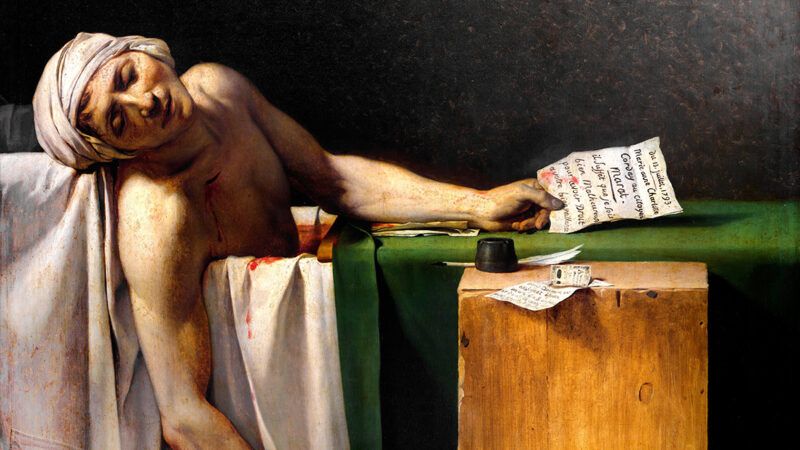What Republicans and Democrats Can Learn From the Jacobins' Spiraling Crisis
At every stage, a breach on one side provoked an even more extreme response on the other.

It was early 1793, and the situation in France after its revolution had begun to spiral out of control.
The Jacobins by then had split into factions. The Girondins, initially at the revolutionary vanguard, were disturbed by the movement's tendency to descend into violent radicalism. The previous year, mobs had slaughtered thousands of alleged counterrevolutionaries in their jail cells; in January, the deposed King Louis XVI had been guillotined as a tyrant. The Girondins blamed their rivals, the Montagnards, for these excesses.
Now rioting was breaking out again, spurred by rising food prices. So in March, in an effort to tamp things down, "the Girondins set a precedent that was later used against them," wrote Jeremy D. Popkin in A Short History of the French Revolution, "by stripping the Montagnard journalist-deputy [Jean-Paul] Marat of his parliamentary immunity and having him tried for inciting violence."
They weren't wrong about Marat. He was indeed a rabble-rouser, having declared early in the revolution that "five or six hundred heads cut off" could have stopped the opposition. Yet it didn't take long for the move to backfire. Marat was acquitted by a friendly tribunal in April, and the Girondins were purged from the National Convention, France's governing body, in June. According to the historian Isser Woloch in his foreword to Twelve Who Ruled: The Year of Terror in the French Revolution, the Convention "then was free to begin putting into place draconian emergency laws that amounted to a temporary revolutionary dictatorship."
The Girondin leaders weren't just removed from their legislative roles. Branded as traitors, dozens were executed or driven to suicide before year's end. When a Girondin sympathizer stabbed Marat to death, it provided all the justification the remaining Jacobins needed to inaugurate, and then escalate, the Reign of Terror.
What seems notable in this snapshot of events is that, each step of the way, participants felt they had every excuse and perhaps no choice but to ignore the rules of the game that might otherwise have reined in the excesses of the day. Yet at every stage, a breach on one side provoked an even more extreme response on the other, and the crisis spiraled further.
American politics today can follow a similar pattern. The far left demands that President Joe Biden pack the Supreme Court before it's too late—and points to the hardball politics of Senate Republicans that brought about the high court's conservative majority as a pretext. Republicans counter that they were just mirroring the tactics of Democrats, who during the Reagan administration politicized the confirmation process and during the Obama administration invoked the "nuclear option" for judicial appointments.
The parties jostle for temporary advantage, certain of the righteousness of their respective crusades, while trust in the institutions that make peaceful coexistence possible drains away.
This article originally appeared in print under the headline "How Political Crises Spiral."


Show Comments (36)